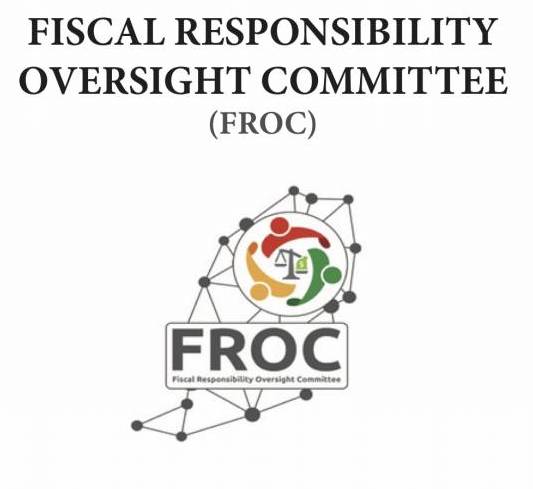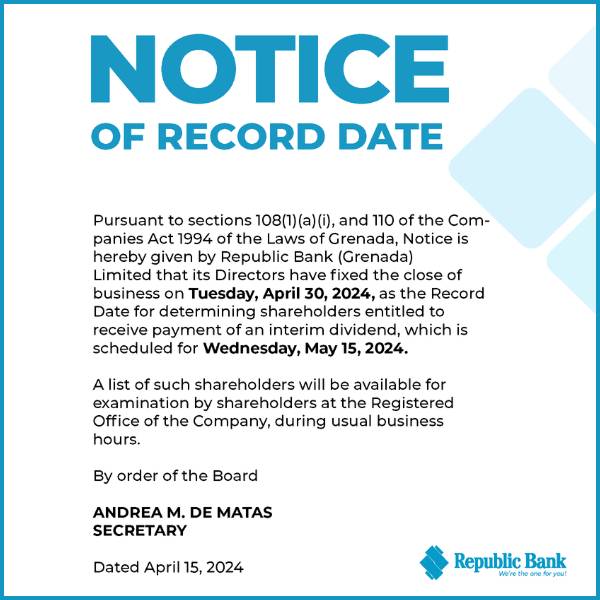by Richard W Duncan
Borrow and pay in full and in a timely manner — there is no increase in the public debt.
There have emerged 2 fully crystallised approaches to funding the arrears of pensions and gratuities arising from Justice Glasgow’s ruling. One approach is rooted in compassion, dignity, love of humanity and country; the other is not.
In truth, in fact, and in law the arrears of pension and gratuity is a debt (an amount due and owing). It is an addition to our stock of public debt as defined in the Fiscal Responsibility Act (Act 29) of 2015. So, the public debt has already increased by the full amount that is due and owing as a consequence of the judgment; and is a charge on the Consolidated Fund.
This component of the public debt i.e., the amounts that are due and owing to the retirees should be settled in full and in a timely manner. These retirees, as lenders to the state, are old and ageing persons in dire need of their monies. They are persons robbed of their dignity and stripped of their pride.
Should the fiscal authorities borrow from the financial system, this new (substitute) set of lenders (banks, insurance companies, social security schemes, private investors etc.) will replace the current lenders i.e., the old, ageing and dying retirees. Now, these new (substitute) lenders can wait to get back their money. They are not ill with mounting medical bills or treatment they have to go without; they are not bedridden, or have houses in dire need of repairs or retrofitting for wheelchair access or grandchildren for whom they want a future much better than theirs. These substitute lenders are entities and individuals who can rent out their money to the state and wait to collect it later.
Therefore, the fiscal authorities should raise the money from those who are in the business of lending, not from retirees who justly deserve to live out their evening years in dignity free of torment and botheration. The stock of public debt will be unchanged and the country, economy and society will be better off for it.
Most importantly, intellectual brinksmanship is not on when it comes to public finances. The Glasgow judgment demonstrates the folly of such behaviour. Since 1985 Public Administrators and Policy Analysts knew or verily believed that the Pension Disqualification Act could not stand. The hope among some was that the ‘problem’ will somehow go away. On that notion, all manner of manoeuvers and machinations were manufactured to the cause the ‘problem’ to go away — it did not — and now the chickens have come home to roost.
There is a matter which flows from the judgment which sets the stage for another episode of intellectual brinksmanship, of intellectual dishonesty, denial and tomfoolery. That is whether and to what extent interest can and should accrue on the monies due and owing to retirees.
In the simplest of economic and financial considerations, the answer is ‘yes’, since with the passage of time, inflation erodes the value of money, and interest on the amounts due and owing compensates for that. Also having not received their money since 2012, retirees have postponed ‘current consumption’ during that period 2012- 2022, which has to be rewarded, in the form of interest payments. On the basis of fairness and ethics the answer is also ‘yes’ — it is downright wrong, even callous to the extreme to unlawfully deprive or deny someone their just due for a prolonged period of time, without compensation.
However, the posture of the state on issues like these is, “It’s a matter of law, so let’s go to court.” Now, legal proceedings are costly and lengthy — one side wins, the other loses, and the state seldom ever wins. Even more egregious is that the cost of these losses is paid for by the taxpaying public whose interest and welfare the state should protect and promote, rather than destroy and down-press.
The resolution of matters between the state and the citizens must always be within a framework of, ‘What is the right thing to do?’, ‘What is fair in the circumstances?’ and ‘What is ethically correct?’
Once we frame a problem in legal terms, we must bear in mind that for every legal question there are as many correct answers as there are lawyers…that is, until the matter reaches the court and the judge(s) rules.
As I have argued elsewhere, “The reality is that these arrears constitute a debt — a charge on the consolidated fund. Therefore, it is fiscally prudent and economically wise to raise the cash from the financial system on the most favourable terms possible, especially interest rate, and settle the debt to the retirees. The economic spin-offs will be significant. Additionally, should the retirees move the court to award interest on the debt which has arisen from its ruling, that interest rate could be as high as 6%.”
Therefore, the fiscal authorities should borrow the money, settle the matter in full and in a timely manner. There is no need to drag this out by embarking on another episode of intellectual brinksmanship only to end up in a worse-off situation — 37 years (1985-2022) is a long time to be in the school of experience, and still not learn.
A parting word, it may seem to take an eternity, but the chickens always come home to roost!
Richard Duncan is a retired banker and former Accountant General, and Deputy Director of Budget & Fiscal Policy in the Ministry of Finance, Grenada.

























What is needed is pension reform so that all citizens can have a relatively decent retirement. Why should all citizens be taxed to pay pension and gratuity for some workers when they themselves do not contribute to their pension. Is it in any way moral or just to further impoverish citizens for the benefit of a few. Should citizens be asked to pay into their own pension fund, pay NIS and pay public workers pension? This cannot be the right thing to do.
After reading the comments this far, I’d like to advise you all to research the author of this article, and you shall see that he is a man who knows what he is talking about.
Mr. Richard Duncan’s impressively expressed views on the lingering pension issue seem to make a whole lot of sense even in light of the comments by Scoobsie. According to some schools of thought, given the intent and provisions of the National Insurance Scheme (NIS) which was instituted by the People’s Revolutionary Government (PRG), the pension plan in Grenada should have been discontinued a long time ago. But such an argument would be plausible only if the apparent pension payment/NIS payment clash was arbitrated with the same rules across the board. It seems fair to suggest, however, that the current situation regarding the two issues amounts to nothing more than the perpetration of a system of “OCCUPATIONAL APARTHEID” (discrimination/segregation). No politician could claim to truly care about the welfare of former state employees while denying such public servants the means of a comfortable retirement, and at the same time insisting that politicians are deserving of such benefits. Such a system is clearly analogous to the days when members of the (so-called) royal family were exempt from paying taxes while their “loyal subjects” were burdened with some of the most onerous payments to “the crown”. But time has caught up with such a privileged (“caste”) system and Elizabeth (“the queen”) and her entire coterie have been brought down to earth as far as such a discriminatory system is concerned. Its even more egregious to think that while some citizens in the government employ are compelled to retire as soon as they turn 60 years of age (no matter how many days shy they might be of completing certain applicable statutory requirement to qualify for a pension), other public servants with the right connections who are well-past the retirement age are allowed to continue to earn a pay cheque. Some persons are even newly hired after having passed their sixtieth birthday. What is sauce for the goose should be sauce for the gander. And so, as long as any one person (politician or not) who benefits from the public purse could qualify for a pension, every public servant should likewise be able to benefit. Meanwhile, let the NIS continue to serve the interests of others who may not fall within the stated category of “former government employee”.
Mr. Richard Duncan’s impressively expressed views on the lingering pension issue seem to make a whole lot of sense even in light of the comments by Scoobsie. According to some schools of thought, given the intent and provisions of the National Insurance Scheme (NIS) which was instituted by the People’s Revolutionary Government (PRG), the pension plan in Grenada should have been discontinued a long time ago. But such an argument would be plausible only if the apparent pension payment/NIS payment clash was arbitrated with the same rules across the board. It seems fair to suggest, however, that the current situation regarding the two issues amounts to nothing more than the perpetration of a system of “OCCUPATIONAL APARTHEID” (discrimination/segregation). No politician could claim to truly care about the welfare of former state employees while denying such public servants the means of a comfortable retirement, and at the same time insisting that politicians are deserving of such benefits. Such a system is clearly analogous to the days when members of the (so-called) royal family were exempt from paying taxes while their “loyal subjects” were burdened with some of the most onerous payments to “the crown”. But time has caught up with such a privileged (“caste”) system and Elizabeth (“the queen”) and her entire coterie have been brought down to earth as far as such a discriminatory system is concerned. Its even more egregious to think that while some citizens in the government employ are compelled to retire as soon as they turn 60 years of age (no matter how many days shy they might be of completing certain applicable statutory requirement to qualify for a pension), other public servants with the right connections who are well-past the retirement age are allowed to continue to earn a pay check. Some persons are even newly hired after having passed their sixtieth birthday. What is sauce for the goose should be sauce for the gander. And so as long as any one person (politician or not) who benefits from the public purse could qualify for a pension, every public servant should likewise be able to benefit. Meanwhile, let the NIS continue to serve the interests of others who may not fall within the stated category of “former government employee”.
Government has no money per se. It only has what it takes from the countries people and businesses. Taking from the fairly poor population, to bolster the comfy job for life civil servants is itself a dubious act.
The author might like to know that 15 million people in britain have received state pensions for 100 years on what he calls a ‘state ponzi scheme’ – in other words if fiscally prudent, there is nothing wrong with current taxation paying for current pensions.
I dont know if legally the retirees are due monies, and i know that this is going to hang over who wins the election, that is for the courts to decide who promised what, but i bet it gets escalated.
Its a very emotive subject, talking about pension funds and their underfunded nature. However what is an underfunded pension? Under International Accounting Standards pension funds are required to report the size of their liability if the fund was to cease collecting. This is then the maximum size of their liability and will in effect always show that there is a deficiept. A company or Government will only need to make good on that deficit in the event they close down the pension scheme. Pension obligations can continue to be paid from the under-funded scheme because new contributions are being paid by people still working. In this way, a pension scheme operates as a legal ponzi scheme.
This happens the world over and is the way pension schemes are managed. They’re not personal savings schemes. Yes it would be better if they were, but that’s not how they were developed or are structured. To suggest therefore that a company or government borrow from a financial services organisation to bridge this theoretical gap is wasteful and naive to suggest. More importantly it shows that the author does not understand how pension schemes are designed to operate.
The people are the country don’t forget that. So do something for them.
The affected people in the country are in no position to wait they are damaged already. The writer has the affected persons at heart
Borrow? BORROW? Grenada is in no position to borrow on anything remotely approaching affordable terms. How much would this cost each and every citizen? How many dollars, Mr. former Deputy Director? How much damage to an already impoverished nation would this do? What hat are you wearing when you talk about “the right thing to do”? Whose interest do you have at heart?
“Whose interest do you have at heart?”, the question we all must consider as we comment. We tend to fashion our mindset and words based on our current and future situation and the degree of empathy we have for others. The world has become a space where ‘my well-being’ takes precedence over the greater good for our fellow mankind. We cannot be faulted for our opinions but God help us for the way we treat others when we ourselves will never accept the same for ourselves. Apparently, ethics have clearly gone out the door, it’s now all about profiteering. Tough times call for brave leadership not those who look for the easy way out.